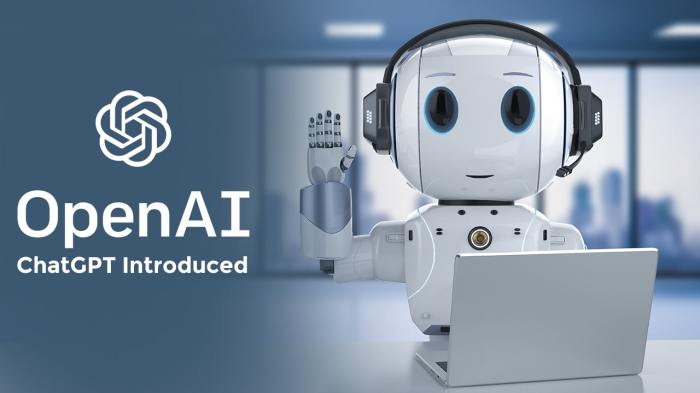
OpenAI Launches Grant Program for Responsible AI
OpenAI launches grant program to foster responsible AI advancements, a bold initiative aimed at shaping the future of artificial intelligence. This program, a testament to OpenAI’s commitment to ethical AI development, seeks to support researchers and developers working on groundbreaking projects that address the complex challenges of responsible AI.
The grant program is designed to encourage innovation in areas such as AI safety, fairness, and transparency. By providing funding and mentorship, OpenAI aims to empower researchers to develop AI technologies that benefit society while mitigating potential risks. This initiative reflects the growing recognition of the importance of responsible AI development, a crucial aspect of ensuring that AI technologies are used for good.
OpenAI’s Grant Program
OpenAI, a leading research company in artificial intelligence, has launched a grant program to encourage responsible AI development. The program aims to support researchers and developers working on projects that address the potential risks and ethical challenges associated with AI.
The Purpose and Goals of the Program
The grant program is designed to foster research and development of AI systems that are safe, fair, and beneficial to society. It seeks to promote the responsible use of AI by supporting projects that address critical areas such as:
- AI Safety and Alignment: Projects that focus on ensuring AI systems behave as intended and are aligned with human values. This includes research on techniques to prevent unintended consequences and ensure AI systems remain under human control.
- AI Fairness and Bias Mitigation: Projects that explore methods to reduce bias in AI systems and ensure they treat all users fairly. This involves developing algorithms that are less susceptible to discrimination based on factors such as race, gender, or socioeconomic status.
- AI Transparency and Explainability: Projects that aim to make AI systems more transparent and explainable, allowing users to understand how decisions are made and identify potential biases. This includes developing methods for visualizing and interpreting AI models.
- AI Privacy and Security: Projects that focus on protecting user privacy and data security in AI systems. This involves developing techniques for anonymizing data, protecting sensitive information, and preventing malicious attacks on AI systems.
Grant Application Criteria and Selection Process
To be eligible for a grant, applicants must submit proposals that demonstrate a clear understanding of the potential risks and benefits of AI. The proposals should also Artikel a well-defined research plan with specific objectives, methodologies, and expected outcomes.
- Project Impact: Proposals should demonstrate the potential impact of the research on addressing responsible AI development. The project should be relevant to the program’s focus areas and have the potential to contribute to the advancement of responsible AI.
- Technical Feasibility: Proposals should Artikel a technically sound research plan with a clear understanding of the challenges and potential solutions. The project should be feasible and achievable within the proposed timeline and budget.
- Team Expertise: The research team should possess the necessary expertise and experience to successfully execute the proposed project. The team should include individuals with relevant backgrounds in AI, ethics, social science, or other related fields.
The selection process involves a rigorous review of all submitted proposals by a panel of experts in AI and related fields. The panel evaluates proposals based on the criteria Artikeld above and selects projects that demonstrate the highest potential for impact and feasibility.
OpenAI’s new grant program is a positive step towards ensuring AI development benefits everyone. It’s crucial to consider the ethical implications of AI across various sectors, including the dynamic world of soft commodities trading. For insights into the exciting opportunities in coffee, cocoa, cotton, and sugar markets, check out this informative article on soft commodities trading.
By fostering responsible AI advancements, we can create a future where technology empowers sustainable practices in industries like agriculture and trade.
Fostering Responsible AI Advancements
OpenAI’s mission is to ensure that artificial general intelligence benefits all of humanity. This commitment extends beyond building powerful AI systems to encompass the ethical and societal implications of their development and deployment. Recognizing the critical role of responsible AI development in achieving this mission, OpenAI has launched a grant program aimed at fostering research and projects that address the challenges and opportunities presented by advanced AI.
The Importance of Responsible AI Development
The potential of AI to revolutionize various aspects of our lives is undeniable. However, this transformative potential comes with significant ethical considerations. Unchecked AI development could lead to unintended consequences, exacerbating existing societal inequalities, undermining privacy, or even posing threats to human safety.
Responsible AI development is crucial to mitigate these risks and ensure that AI serves as a force for good in the world.
Key Challenges and Ethical Considerations in AI Research and Development
- Bias and Fairness:AI systems trained on biased data can perpetuate and amplify existing societal prejudices. For instance, facial recognition systems have been shown to be less accurate for people of color, potentially leading to discriminatory outcomes in law enforcement and other areas.
OpenAI’s new grant program is a fantastic step towards ensuring that AI development prioritizes ethical considerations. It reminds me of Warren Buffett’s philosophy of long-term value investing, a strategy explored in depth in unleashing the oracle of omahas success the journey of warren buffett.
Just as Buffett focuses on building sustainable businesses, OpenAI’s program aims to cultivate responsible AI advancements, fostering a future where AI benefits all of humanity.
- Privacy and Data Security:The collection and use of vast amounts of personal data for AI training raises concerns about privacy violations and potential misuse. Safeguarding sensitive information and ensuring transparency in data practices are essential for building trust in AI systems.
- Job Displacement and Economic Impact:The automation of tasks by AI could lead to job displacement in various sectors, raising concerns about economic inequality and social unrest. It is crucial to develop strategies to mitigate these potential impacts, such as retraining programs and policies that promote equitable access to the benefits of AI.
- Explainability and Transparency:The decision-making processes of complex AI models can be opaque, making it difficult to understand why they arrive at certain conclusions. Explainability is essential for building trust in AI systems and ensuring accountability for their actions.
- Safety and Control:As AI systems become more sophisticated, concerns about their potential for misuse and unintended consequences grow. Developing robust safety mechanisms and ethical frameworks for AI development is crucial to ensure that AI remains under human control.
Impact and Benefits of the Program

OpenAI’s grant program, aimed at fostering responsible AI advancements, has a significant impact on the field of AI research and development. The program, through its funding and support, empowers researchers and developers to explore innovative ideas and address critical challenges in AI ethics, safety, and accessibility.
Past Grant Recipients and Their Projects
The grant program has already supported a diverse range of projects that demonstrate the potential of responsible AI. For example, the grant program has supported projects that focus on:
- Developing AI systems that are more transparent and explainable, allowing users to understand how these systems reach their conclusions.
- Designing AI algorithms that are less susceptible to bias, ensuring fairness and equity in their applications.
- Creating AI tools that can be used to detect and mitigate the spread of misinformation and disinformation.
One notable example is the work of the research team at the University of California, Berkeley, who received a grant to develop an AI system that can detect and prevent the spread of harmful content on social media platforms. This project has the potential to significantly impact online safety and combat the spread of misinformation.
Impact on AI Research and Development
The OpenAI grant program has a significant impact on the field of AI research and development by:
- Encouraging innovation and pushing the boundaries of AI research by providing funding for ambitious and potentially high-risk projects.
- Promoting collaboration among researchers and developers by fostering a community of individuals working towards responsible AI advancements.
- Accelerating the development of responsible AI technologies by providing resources and support to promising research projects.
By supporting these efforts, the grant program is helping to shape the future of AI in a way that prioritizes ethics, safety, and societal benefit.
OpenAI’s grant program is a fantastic initiative to encourage ethical AI development, reminding me of how Ethereum, a platform that enables smart contracts and decentralized applications, stands apart from Bitcoin, a purely transactional cryptocurrency. How Ethereum is different from Bitcoin is a fascinating topic, and I believe both advancements in blockchain technology and responsible AI development are crucial for a more equitable and secure future.
Just like Ethereum empowers developers to build innovative applications, OpenAI’s program fosters a community of AI researchers committed to ethical advancements.
Long-Term Benefits of Fostering Responsible AI Advancements
The long-term benefits of fostering responsible AI advancements are far-reaching and extend beyond the realm of AI research and development. These benefits include:
- Building trust in AI technologies by ensuring that they are developed and deployed in a responsible and ethical manner.
- Promoting the equitable and inclusive use of AI, ensuring that its benefits are accessible to all members of society.
- Mitigating potential risks associated with AI, such as job displacement or the misuse of AI for malicious purposes.
By investing in responsible AI advancements, we can create a future where AI technologies are used to solve some of the world’s most pressing challenges while also ensuring that these technologies are used ethically and responsibly.
OpenAI’s Role in the AI Ecosystem: Openai Launches Grant Program To Foster Responsible Ai Advancements

OpenAI is not just another player in the rapidly growing AI landscape; it is a driving force shaping the future of artificial intelligence. Its impact extends far beyond its own research and development, influencing the entire AI ecosystem through its commitment to open research, collaboration, and responsible AI development.
OpenAI’s Influence on the AI Community
OpenAI’s influence on the AI community stems from its reputation as a leading research organization and its commitment to sharing its advancements with the world. The organization’s research papers, often published in top academic journals, have significantly advanced the field of AI, particularly in areas like natural language processing and machine learning.
These publications serve as foundational works for researchers worldwide, inspiring further exploration and innovation.
“OpenAI’s research has significantly advanced the field of AI, particularly in areas like natural language processing and machine learning.”
OpenAI’s open-source software releases, such as the GPT-3 language model, have democratized access to powerful AI tools, enabling developers and researchers around the globe to build upon OpenAI’s work. This collaborative approach has fostered a vibrant ecosystem of AI development, leading to a rapid acceleration of progress in the field.
“OpenAI’s open-source software releases, such as the GPT-3 language model, have democratized access to powerful AI tools.”
OpenAI’s Commitment to Open Research and Collaboration
OpenAI’s commitment to open research is evident in its practice of publishing its research findings, code, and data sets openly. This transparent approach allows the broader AI community to benefit from OpenAI’s work, accelerating progress and fostering collaboration. OpenAI also actively engages with the research community through workshops, conferences, and online forums, promoting knowledge sharing and cross-pollination of ideas.
“OpenAI’s commitment to open research is evident in its practice of publishing its research findings, code, and data sets openly.”
OpenAI’s open-source software releases, such as the GPT-3 language model, have democratized access to powerful AI tools, enabling developers and researchers around the globe to build upon OpenAI’s work. This collaborative approach has fostered a vibrant ecosystem of AI development, leading to a rapid acceleration of progress in the field.
“OpenAI’s open-source software releases, such as the GPT-3 language model, have democratized access to powerful AI tools.”
The Grant Program and OpenAI’s Mission
OpenAI’s grant program aligns perfectly with its overall mission of ensuring that artificial general intelligence benefits all of humanity. By supporting research projects focused on responsible AI development, the program directly contributes to OpenAI’s goal of mitigating potential risks and ensuring that AI is used for good.
“OpenAI’s grant program aligns perfectly with its overall mission of ensuring that artificial general intelligence benefits all of humanity.”
The grant program also reflects OpenAI’s belief in the power of collaboration. By providing funding and support to researchers from diverse backgrounds, OpenAI aims to foster a global community of AI experts working together to address the challenges and opportunities presented by AI.
“By providing funding and support to researchers from diverse backgrounds, OpenAI aims to foster a global community of AI experts working together to address the challenges and opportunities presented by AI.”
Future of Responsible AI
The future of responsible AI development is a dynamic landscape shaped by technological advancements, ethical considerations, and societal expectations. Organizations like OpenAI play a crucial role in navigating this evolving terrain, fostering a future where AI is developed and deployed ethically and responsibly.
Trends and Challenges in Responsible AI Development
The future of responsible AI development is marked by several trends and challenges:
- Growing Complexity:As AI models become more sophisticated, their decision-making processes become increasingly complex, making it difficult to understand and explain their reasoning. This complexity presents challenges in ensuring transparency, accountability, and fairness in AI systems.
- Data Bias and Fairness:AI systems are trained on massive datasets, which often reflect existing societal biases. This can lead to biased outcomes, perpetuating discrimination and inequality. Addressing data bias and ensuring fairness in AI algorithms is a critical challenge.
- Privacy and Security:The increasing reliance on AI raises concerns about data privacy and security. AI systems often require access to sensitive personal information, which can be vulnerable to breaches or misuse. Balancing the benefits of AI with the need for robust privacy and security measures is essential.
- Regulation and Governance:As AI becomes more prevalent, there is a growing need for clear regulations and governance frameworks to ensure responsible development and deployment. Establishing guidelines for AI development, use, and accountability is crucial to mitigate risks and promote ethical AI practices.
Role of Organizations like OpenAI
Organizations like OpenAI play a vital role in shaping the future of AI by:
- Research and Development:OpenAI and similar organizations conduct cutting-edge research in AI, focusing on developing safe, reliable, and beneficial AI systems. They contribute to the development of new AI technologies, while prioritizing ethical considerations and safety.
- Promoting Responsible AI Practices:OpenAI advocates for responsible AI development and use, promoting ethical guidelines and best practices within the AI community. They contribute to the development of standards and frameworks for responsible AI.
- Public Engagement and Education:OpenAI engages with the public, raising awareness about AI’s potential benefits and risks. They educate stakeholders about the importance of responsible AI development and encourage public discourse on ethical AI issues.
Vision for a Future with Ethical and Responsible AI, Openai launches grant program to foster responsible ai advancements
A future where AI is developed and deployed ethically and responsibly requires a collective effort from various stakeholders, including researchers, developers, policymakers, and the public. This vision encompasses:
- Transparency and Explainability:AI systems should be designed to be transparent and explainable, allowing users to understand how they work and why they make certain decisions. This fosters trust and accountability in AI systems.
- Fairness and Non-discrimination:AI systems should be developed and deployed in a way that is fair and non-discriminatory. This requires addressing data bias and ensuring that AI algorithms do not perpetuate existing inequalities.
- Privacy and Security:Robust privacy and security measures should be implemented to protect sensitive data used in AI systems. This ensures that personal information is handled responsibly and protected from unauthorized access or misuse.
- Human Oversight and Control:AI systems should be designed with human oversight and control mechanisms. This ensures that AI is used responsibly and that humans retain the ability to intervene or adjust AI systems as needed.

